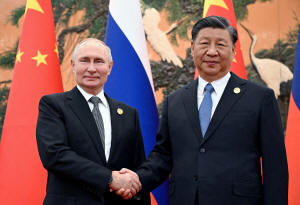China and Russia find common cause in Israel-Hamas crisis
 Send a link to a friend
Send a link to a friend
 [October 20, 2023]
By Yew Lun Tian, Laurie Chen and Michael Martina [October 20, 2023]
By Yew Lun Tian, Laurie Chen and Michael Martina
BEIJING/WASHINGTON (Reuters) - With anger building across the Middle
East over Israel's strikes in Gaza, China and Russia are finding common
cause with countries across the region in support of the Palestinians.
For Moscow and Beijing, Israel's bombardment of Gaza following the Hamas
attacks that killed 1,400 Israelis presents an opportunity to burnish
their credentials as the champions of the developing world, in contrast
with the United States, which has put its support squarely behind ally
Israel.
China has consistently called for restraint and a ceasefire but has also
sharpened its criticism of Israel.
"Israelís actions have gone beyond the scope of self-defense," Chinese
Foreign Minister Wang Yi said this week, called on it to stop its
"collective punishment" of Gaza residents, Chinese state media reported.
Russia has expressed sympathy for the Palestinians while blaming the
U.S. "I think that many people will agree with me that this is a vivid
example of the failure of United States policy in the Middle East,"
Russian President Vladimir Putin said this week.

Both Putin and Chinese President Xi Jinping have sought to deepen ties
to the global south, seeing economic opportunities and possibly a way to
counterbalance the diplomatic influence of the U.S. and its allies.
That was on display this week as China hosted a summit for Xi's
signature Belt and Road Initiative, which has lent hundreds of billions
of dollars for infrastructure projects across the Middle East, Africa,
Latin America and Asia.
Putin attended and met Xi for three hours of talks that included "an
in-depth exchange of views on the Palestinian-Israeli situation", China
said.
"China and Russia still see (the crisis) more in terms of the United
States than in terms of either Palestine or Israel," said Jon Alterman,
director of the Middle East Program at the Center for Strategic and
International Studies in Washington.
"If the United States can effectively rally the world, itís bad for
them. If the U.S. and its allies grow increasingly isolated, they see
that as good for them."
SUPPORT FOR PALESTINE
While the strategies of Russia and China in the Middle East are not
fully aligned they have much in common.
Russia is sharply critical of the U.S. but China has mostly avoided
criticizing it, a contrast to early in the Ukraine war, when China's
support of Russia turned an unwelcome spotlight on its diplomatic
position.
China signaled its growing influence in the Middle East this year when
it announced a surprise deal on the restoration of ties between Saudi
Arabia and Iran.
Russia too has been improving ties with Iran, which has included
supplies of Iranian drones and common cause in backing Syrian President
Bashar al-Assad.
Both China and Russia share a history of support for the Palestinians -
and are critical of what they say is the marginalization of them by the
United States.
[to top of second column]
|

Russian President Vladimir Putin shakes hands with Chinese President
Xi Jinping during a meeting at the Belt and Road Forum in Beijing,
China, October 18, 2023. Sputnik/Sergei Guneev/Pool via REUTERS/File
Photo

"Thereís clearly a shared interest in emphasizing the negative role
of the U.S. in the conflict," said Jean-Loup Samaan, senior research
fellow at the Middle East Institute of the National University of
Singapore.
"And that fits within their broader narrative on the need to build
an alternative world order to the U.S."
Russia's state media has said it was sending humanitarian aid to
Gaza and China has sent its Middle East envoy to the region, where
he met Russia's special representative. Russia said on Thursday it
was coordinating Middle East policy with China.
While Chinese media covered the Hamas attacks on Oct. 7, since then
reports have carried images of Palestinian suffering, with some
prominently citing Palestinian sources as saying Israel was
responsible.
"None of the reality that shocked much of the world on Oct. 7 is in
Chinese news. Instead, the news features Israeli bombing of Gaza
without explaining that the target is only Hamas infrastructure,"
Carice Witte, director of the SIGNAL Group, a Sino-Israel relations
think tank based in Tel Aviv.
SEEKING ALLIES
Russia's war in Ukraine gives it an added incentive to align itself
with the Palestinian cause.
The United States has been trying, with limited success, to persuade
the global south to rally behind Ukraine. Portraying the U.S. as a
driver of the conflict helps blunt that effort.
Alterman sees a similar motivation for China, which regards the U.S.
as its chief geopolitical rival.
"China is trying to play the global south card, irrespective of its
close ties to Israel. More than actually supporting Hamas, it is
quietly helping build resistance to U.S. efforts to build
international support for Israel," said Alterman.

Ma Xiaolin, a Middle East expert and professor at Zhejiang
International Studies University, said China was being even-handed
between the Palestinians and Israel but if pushed, would side with
its Arab partners.
"If Israel, with the support of the United States, expands the scale
and scope of the war and causes more humanitarian casualties, China
will definitely tilt the balance in favour of the Palestinians,"
said Ma.
(Additional reporting by James Pomfret in Hong Kong and Guy
Faulconbridge; writing by Don Durfee; editing by Robert Birsel)
[© 2023 Thomson Reuters. All rights
reserved.]This material
may not be published, broadcast, rewritten or redistributed.
Thompson Reuters is solely responsible for this content. |